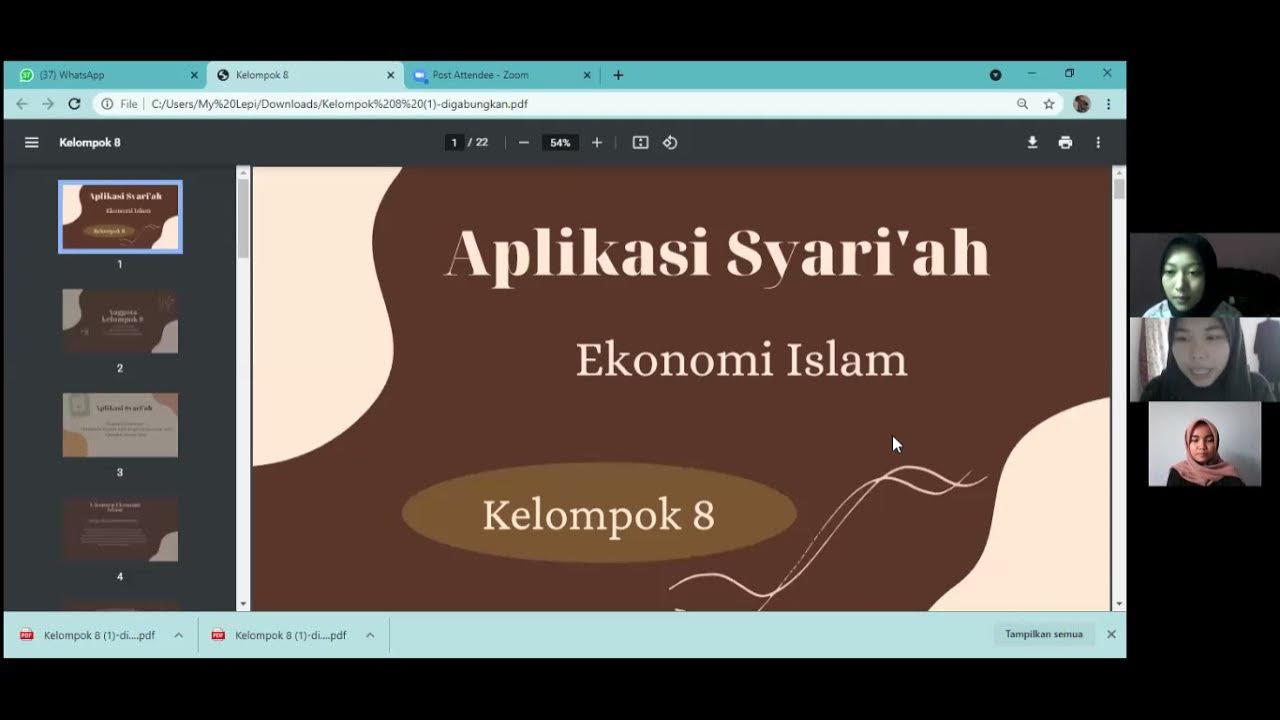Prinsip Dan Praktik Ekonomi Islam Kelas 11
Summary
TLDRIn this video, the instructor discusses the principles and practices of Islamic economics, emphasizing the importance of social interaction and mutual support in fulfilling life’s needs. The lesson covers key Islamic principles such as fair trade, prohibition of interest (riba), zakat, and cooperation. The video delves into muamalah (transactions), including various forms like buying, selling, renting, and lending. Additionally, it highlights the ethical guidelines for transactions and outlines the conditions for valid and unlawful sales in Islam. The discussion extends to modern economic systems, including online transactions, and their alignment with Islamic teachings.
Takeaways
- 😀 Islamic economy encourages fair, mutual exchanges and prohibits wrongful acquisition of wealth, emphasizing the importance of honest transactions.
- 😀 The prohibition of Riba (usury) is a fundamental principle in Islamic economics, highlighting that interest-based transactions are not allowed.
- 😀 Zakat, or charity, is a mandatory act of giving in Islam, ensuring wealth distribution and social responsibility.
- 😀 The concept of 'Tolong-menolong' (helping one another) is key in Islamic economic practices, promoting community welfare.
- 😀 Muamalah refers to interactions like buying, selling, renting, and lending, focusing on beneficial exchanges for both parties.
- 😀 Islam forbids exploitative practices such as fraud, gambling, or unfair pricing in trade, ensuring that transactions are just and ethical.
- 😀 In Islamic trade, both parties must agree voluntarily without coercion, and the goods being traded should be lawful and clearly defined.
- 😀 Hiyar (choice) allows both the buyer and seller to cancel or modify a transaction during the buying process or within specific conditions.
- 😀 Certain types of transactions are prohibited in Islam, such as selling harmful items like alcohol, pork, or anything that is uncertain or unclear.
- 😀 Modern-day online trading can be permissible in Islam as long as it follows the principles of fairness, transparency, and avoids prohibited practices.
Q & A
What is the main topic of this lesson?
-The main topic of this lesson is the principles of Islamic economics and muamalah (social transactions), including topics like trade, riba (interest), zakat, and how Islamic law governs interactions such as buying, selling, borrowing, and lending.
What does muamalah mean in Islamic context?
-Muamalah refers to the exchange of goods or services that provide mutual benefits, such as buying and selling, renting, borrowing, and other activities related to social and economic interactions, governed by Islamic law.
What are the four key principles of Islamic economics mentioned in the lesson?
-The four key principles of Islamic economics are: 1) Not consuming wealth unjustly, 2) Prohibition of riba (interest), 3) Giving zakat, and 4) Cooperation and helping one another.
Why is the prohibition of riba important in Islamic economics?
-The prohibition of riba (interest) is important because it prevents exploitation and ensures that financial transactions are based on fairness, avoiding unjust enrichment or harm to one party.
What does the term 'hiar' mean in the context of buying and selling?
-Hiar refers to the mutual consent between the buyer and seller, allowing both parties the freedom to continue or cancel a transaction without coercion. It emphasizes transparency and fairness in trade.
What are the conditions that must be met for a valid Islamic transaction?
-For a valid Islamic transaction, both parties must be of sound mind and legally responsible (baligh), there must be mutual consent without any coercion, the goods or services must be lawful and beneficial, and the transaction must be clear and transparent.
What is the ruling on selling goods that are unclear or cannot be delivered?
-It is forbidden to sell goods that cannot be delivered, such as selling fish in the sea or items that are not physically present, as these transactions involve deceit and uncertainty.
What does zakat mean, and why is it important in Islamic economics?
-Zakat is a form of obligatory almsgiving in Islam, where a portion of wealth is given to those in need. It is important because it helps to redistribute wealth, reduce inequality, and purify one's wealth.
Can Islamic economics be applied to online transactions?
-Yes, Islamic economics can be applied to online transactions as long as they adhere to the principles of mutual consent, fairness, and the prohibition of unlawful activities such as riba or gambling. The modern shift towards online commerce does not change the core values of Islamic economic principles.
What are the types of transactions that are forbidden in Islam?
-Forbidden transactions include those involving harm, such as charging excessive interest (riba), selling prohibited items (like alcohol or pork), and engaging in deceitful practices like manipulating prices, selling defective goods without disclosure, or making transactions during inappropriate times (like before Friday prayers).
Outlines

Esta sección está disponible solo para usuarios con suscripción. Por favor, mejora tu plan para acceder a esta parte.
Mejorar ahoraMindmap

Esta sección está disponible solo para usuarios con suscripción. Por favor, mejora tu plan para acceder a esta parte.
Mejorar ahoraKeywords

Esta sección está disponible solo para usuarios con suscripción. Por favor, mejora tu plan para acceder a esta parte.
Mejorar ahoraHighlights

Esta sección está disponible solo para usuarios con suscripción. Por favor, mejora tu plan para acceder a esta parte.
Mejorar ahoraTranscripts

Esta sección está disponible solo para usuarios con suscripción. Por favor, mejora tu plan para acceder a esta parte.
Mejorar ahoraVer Más Videos Relacionados
5.0 / 5 (0 votes)






